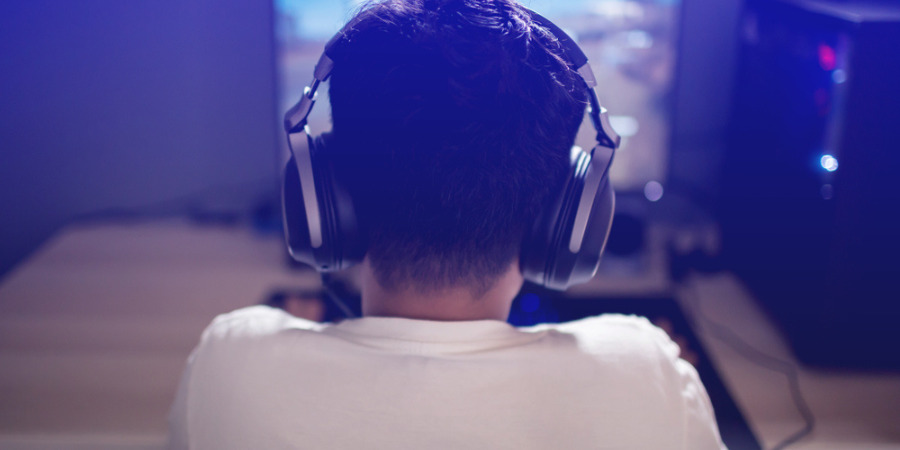Last Updated:
May 16th, 2025
Gaming Addiction | Symptoms, Effects and Causes
Computer games frequently get flak for everything from laziness in teenagers to violence in playgrounds. While many criticisms of gaming are unfair and often baseless, concerns about gaming addiction are very much justified. In the UK alone, it is believed that between 700,000 and 1,000,000 individuals are struggling with gaming addiction. While it may be a newly recognised issue, gaming addiction has already destroyed many lives, but knowing the signs, causes, and consequences can help protect you.

What is gaming addiction?
The most straightforward gaming addiction definition is when you can’t stop playing no matter what is happening as a result. Gaming addiction is a compulsion which consumes your whole life, often at the cost of health, relationships, responsibilities and even basic survival needs.
Many people (including 93% of British children) play computer games, which can be a great way to relax and socialise. It is, therefore, very important to differentiate between addiction and “normal” gaming. Even if you play computer games more than you should, it doesn’t mean that you are necessarily addicted. It is only when gaming begins to harm some aspect of your life that you still can’t stop that gaming addiction has taken hold.
How does gaming addiction develop?
The compulsive need to game can be just as overpowering as the urge to consume drugs or alcohol. This is because a behavioural addiction essentially hijacks the same reward circuits in the brain as a substance addiction. In fact, the similarity between gaming and drug addictions was described by one expert like this:
“Computer games are like heroin. Once you are hooked, it’s hard to get unhooked.”
Playing video games can make you feel great for a little while, helping you forget about problems and enjoy yourself. Much like with substance addiction, however, you can build a tolerance to gaming. This means you might need to play games for longer or dive into more immersive games to satisfy the craving.
You can then become totally dependent on gaming, and if you can’t play, you may start experiencing discomfort, which is eerily similar to substance cravings or withdrawal symptoms. On top of this, you can become completely emotionally and psychologically trapped, relying on computer games entirely to feel happy, calm or just at ease. At this point, quitting may seem difficult and undesirable, so you keep playing, denying that there is an issue despite mounting problems.
Spotting the warning signs of a gaming addiction
Gaming addiction often flies under the radar initially, as many gamers and their peers see extensive gaming as a normal part of life. It can be easy to dismiss concerns when you compare yourself to others who seem to be gaming just as much or even far more than you are.
To help see through the confusion, here are some telltale gaming addiction signs and symptoms to look out for:
- Needing to play longer sessions to feel satisfied.
- Constantly thinking about gaming during your free time.
- Trying to cut down but failing or going back to your old habits quickly.
- Feeling restless or moody when you attempt to cut down on gaming time.
- Playing computer games to escape from your personal issues or feel better when struggling with stress, loneliness or mental health issues.
- Lying to your friends or family about the extent of your gaming.
- Your gaming habits jeopardising your studies, career or important relationships.

Gaming addiction can have serious consequences, so if you recognise these issues, it is time to seek professional gaming addiction help.
What causes a gaming addiction?
Computer games are designed to be fun and keep you playing again and again. However, an estimated 93% of British children play computer games, and the vast majority of them will never become addicted. Gaming addiction is a complex condition, and there are lots of factors that can contribute, including:
The mental and physical dangers of a gaming addiction
Gaming addiction can pose serious risks to both your physical and mental health. Addicted gamers may face obesity from long hours of inactivity, strained eyes from staring at the screen, and repetitive wrist and back stress injuries. Sleep patterns are also frequently disrupted, leading to significant sleep loss and all its associated health risks.
In extreme cases, gaming addiction can even be fatal such as the heartbreaking 2010 incident in South Korea where a three-month-old baby starved to death as her parents were so engrossed in an online game.
Chronic gaming can also lead to serious mental health challenges, exacerbating conditions like depression and anxiety and leading to feelings of isolation and even suicidal thoughts. Efforts to cut back on gaming can induce withdrawal symptoms that include emotional instability, irritability and restlessness, all of which can make daily life a struggle and lead to a relapse.
How to stop gaming when you’re addicted
Overcoming gaming addiction starts with a digital detox, where you stop playing computer games to break your dependence on them. This can be very hard and you may even experience withdrawal symptoms similar to drugs. This is why you should undergo treatment through a professional behavioural addiction rehab programme.
There are some NHS services for gaming addiction, but as it is only a newly recognised condition, these are not widely available. There are, however, a number of private rehab centres across the country which can help you break your gaming addiction and help you build a future life without it.
How to help someone with a gaming addiction
It is time to reclaim your life from gaming with a plan that works for you. If you don’t know where to start, Addiction Helper can help you find the most effective treatment programme and recovery centre for you. Reach out to us and start your journey to recovery with our expert team by your side.
Our compassionate team are ready and available to take your call, and guide you towards lasting the lasting addiction recovery you deserve.
Frequently Asked Questions
(Click here to see works cited)
- Children’s Commissioner. “Gaming the system.” Children’s Commissioner, 2019, https://www.childrenscommissioner.gov.uk/resource/gaming-the-system/. Accessed 9 February 2025.
- Financial Times, and Anna Nicolaou. “Fame and ‘Fortnite’ — inside the global gaming phenomenon.” Financial Times, 2019, https://www.ft.com/content/f2103e72-b38f-11e9-bec9-fdcab53d6959. Accessed 9 February 2025.
- Game Quitters, and Cam Adair. “Video Game Addiction Statistics 2025 – How Many Addicted Gamers Are There?” Game Quitters, 2025, https://gamequitters.com/video-game-addiction-statistics/. Accessed 9 February 2025.
- UK Addiction Treatment Centres. “Behavioural addiction.” UK Addiction Treatment Centres, https://www.ukat.co.uk/addiction/behavioural/. Accessed 6 February 2025.
UK Rehab. “Behavioural Addictions.” UK Rehab, https://www.uk-rehab.com/behavioural-addiction/. Accessed 6 February 2025.

